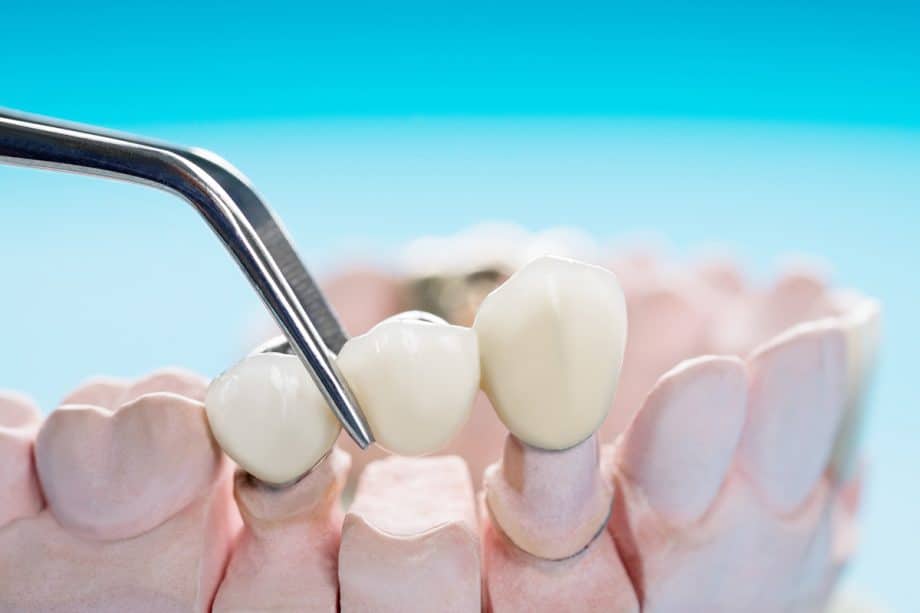Dental bridges can restore your chewing ability and brighten your smile. Typically, it takes about two to three weeks for a dental bridge to settle and for the patient to feel comfortable wearing it.
What is a Dental Bridge?
A bridge is a permanent dental appliance that replaces missing or damaged teeth. Bridges anchor to crowns or dental implants on either side of the gap between the patient's natural teeth. Bridges hold artificial teeth or pontics to replace the missing teeth. Bridges are not removable and last for about ten years.
Benefits of a Dental Bridge
Improves Your Smile
If you have a gap in your smile, you may feel self-conscious. A dental bridge is an attractive replacement for missing or broken teeth and allows you to share your smile.
Improves Chewing Ability
Missing teeth make it challenging to chew your food properly. A bridge restores chewing ability and keeps you from having to chew your food around the gap.
Minimally Invasive
Unlike dental implants, conventional bridges do not require surgery. People with health conditions that make surgery risky can receive dental bridges.
More Stable than Conventional Dentures
Dentures can slip while you are talking or eating, causing discomfort. Bridges are anchored to crowns or implants, making them sturdier.
Types of Dental Bridges
Traditional Bridge
A standard bridge connects to dental crowns on either side of the gap. This type of bridge depends on having two healthy teeth to place the crowns. It can stress your adjacent teeth, so you must keep all scheduled dental appointments.
Implant-Supported Bridge
With an implant-supported bridge, you will not have issues with stress on neighboring teeth. Dental implants replace the crowns bordering the artificial teeth. Implant-supported bridges are sturdier and less prone to breakage.
Cantilever Bridge
A cantilever bridge connects to a crown on one side of the gap between your teeth. This type of bridge can be useful in certain situations but can put more stress on the connected tooth than a conventional bridge.
Maryland Bridge
Maryland bridges have metal wings that cement the adjacent teeth. They produce less tooth stress than conventional bridges but are less sturdy.
The Dental Bridge Process
Getting a new dental bridge takes two to three appointments. First, your dentist will schedule a consultation visit to discuss your options for tooth replacement.
If you decide that a bridge is the best choice, the second appointment involves preparing the natural teeth to receive the bridge. The dentist uses a local anesthetic in the area around your missing tooth for comfort. They clean away all bacteria and plaque.
The dentist shapes the natural teeth for traditional and cantilever bridges to prepare them for crowns. The dentist takes digital scans or physical impressions of the teeth to create a 3-D model for the prosthetic.
Next, the dentist chooses the right shade for your replacement teeth. They install a temporary bridge to protect your teeth while the lab creates your permanent bridge.
After the permanent bridge returns from the lab, your dentist will check its fit and cement it into place. It takes a few weeks for the bridge to settle, but it will feel like a natural tooth after you become accustomed to it.
Caring for Your Dental Bridge
Caring for a dental bridge is not complicated. Keep your teeth as clean as possible, ensuring that you brush and floss each day. Use an interproximal brush and a floss threader (available at any pharmacy) to clean under your bridge daily to prevent tooth decay and gum disease.
Frequently Asked Questions About Dental Bridges
How many appointments does it take to get a dental bridge?
Getting a bridge is much faster than dentures or implants. Receiving a dental bridge takes only two to three visits. If you choose an implant-supported bridge, the process will be longer, but your bridge will be sturdier.
How many teeth can a bridge replace?
Bridges can replace from one to four teeth. Typically, dentists use them to replace one to two teeth at a time.
Call Oak Road Dentistry
If you have missing teeth, you know how much they can affect your self-confidence and quality of life. A dental bridge can restore your smile as well as your chewing ability. Please call our Snellville, GA office at 770-985-9559 to schedule an exam and consultation today.

